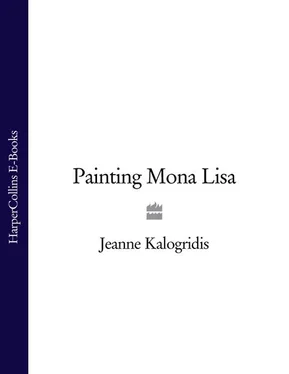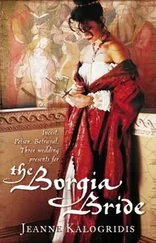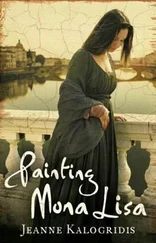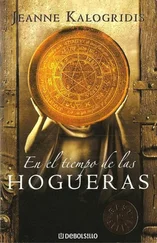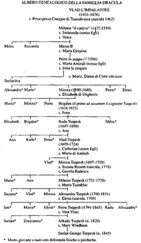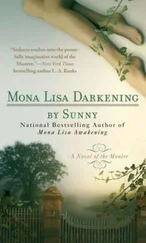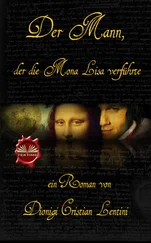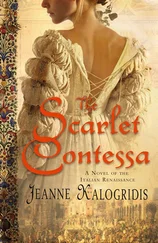As the two stood with blades crossed, neither willing to give way, Lorenzo half shouted: ‘Why should you hate me so?’
He meant the question sincerely. He had always wished the best for Florence and her citizens. He did not understand the resentment others felt at the utterance of the name Medici.
‘For God,’ the priest said. His face was a mere hand’s breadth from his intended victim’s. Sweat ran down his pale forehead; his breath was hot upon Lorenzo’s cheek. His nose was long, narrow, aristocratic; he probably came from an old, respected family. ‘For the love of God!’ And he drew back his weapon so forcefully that Lorenzo staggered forwards, perilously close to the blade.
Before the opponent could shed more blood, Francesco Nori stepped in front of Lorenzo with his sword drawn. Other friends and supporters began to close in around the would-be assassins. Lorenzo became vaguely aware of the presence of Poliziano, of the aged and portly architect Michelozzo, of the family sculptor Verrochio, of his business associate Antonio Ridolfo, of the socialite Sigismondo della Stuffa. This crowd sealed him off from his attacker and began to press him towards the altar.
Lorenzo resisted. ‘Giuliano!’ he cried. ‘Brother, where are you?’
‘We will find and protect him. Now, go!’ Nori ordered, gesturing with his chin towards the altar, where the priests, in their alarm, had dropped the full chalice, staining the altar-cloth with wine.
Lorenzo hesitated.
‘Go!’ Nori shouted again. ‘They are headed here! Go past them, to the north sacristy!’
Lorenzo had no idea who they were, but he acted. Still clutching his sword, he hurdled over the low railing and leapt into the octagonal carved wooden structure that housed the choir. Cherubic boys shrieked as they scattered, their white robes flapping like the wings of startled birds.
Followed by his protectors, Lorenzo pushed his way through the flailing choir and staggered towards the great altar. The astringent smoke of frankincense mixed with the fragrance of spilt wine; two tall, heavy candelabra were ablaze. The priest and his two deacons now encircled the blubbering Riario protectively. Lorenzo blinked at them. The afterimage from the lit tapers left him near blinded, and in an instant of dizziness, he put his free hand to his neck; it came away bloodied.
Yet he willed himself, for Giuliano’s sake, not to faint. He could not permit himself a moment’s weakness – not until his brother was safe.
At the moment that Lorenzo ran north across the altar, Francesco de’ Pazzi and Bernardo Baroncelli were down in the sanctuary, pushing their way south, clearly unaware that they were missing their intended target.
Lorenzo stopped mid-stride to gape at them, causing collisions within his trailing entourage.
Baroncelli led the way, brandishing a long knife and shouting unintelligibly. Francesco was limping badly; his thigh was bloodied, his tunic spattered with crimson.
Lorenzo strained to see past those surrounding him, to look beyond the moving bodies below to the place where his brother had been standing, but his view was obstructed.
‘Giuliano!’ he screamed, with all the strength he possessed, praying he would be heard above the pandemonium. ‘Giuliano …! Where are you? Brother, speak to me!’
The crowd closed around him. ‘It’s all right,’ someone said, in a tone so dubious it failed to provoke the comfort it intended.
It was not all right that Giuliano should be missing. From the day of his father’s death, Lorenzo had cared for his brother with a love both fraternal and paternal.
‘Giuliano!’ Lorenzo screamed again. ‘Giuliano …!’
‘He is not there,’ a muffled voice replied. Thinking this meant that his brother had moved south to find him, Lorenzo turned back in that direction, where his friends still fought the assassins. The smaller priest with the shield had fled altogether, but the madman remained, though he was losing the battle with Marco. Giuliano was nowhere to be seen.
Discouraged, Lorenzo began to turn away, but the glint of swift-moving steel caught his eye and compelled him to look back.
The blade belonged to Bernardo Baroncelli. With a viciousness Lorenzo would never have dreamt him capable of, Baroncelli ran his long knife deep into the pit of Francesco Nori’s stomach. Nori’s eyes bulged as he stared down at the intrusion, and his lips formed a small, perfect o as he fell backwards, sliding off Baroncelli’s sword.
Lorenzo let go a sob. Poliziano and della Stuffa took his shoulders and pushed him away, across the altar and towards the infinitely tall doors of the sacristy. ‘Get Francesco!’ he begged them. ‘Someone bring Francesco. He is still alive, I know it!’
He tried again to turn, to call out for his brother, but this time his people would not let him slow their relentless march to the sacristy. Lorenzo felt a physical pain in his chest, a pressure so brutal he thought his heart would burst.
He had wounded Giuliano. He had hurt him in his most vulnerable moment, and when Giuliano had said, I love you, Lorenzo … Please don’t make me choose, Lorenzo had been cruel. Had turned him away, without help – the one thing he owed Giuliano most of all.
How could he explain to the others that he could never leave his younger brother behind? How could he explain the responsibility he felt for Giuliano, who had lost his father so young and had always looked to Lorenzo for guidance? How could he explain the promise he had made to his father on the latter’s deathbed? They were all too concerned with the safety of Lorenzo il Magnifico, whom they considered to be the greatest man in Florence, but they were wrong, all of them.
Lorenzo was pushed behind the thick, heavy doors of the sacristy. They slammed shut after someone ventured out to fetch the wounded Nori.
Inside, the airless, windowless chamber smelled of sacrificial wine and the dust that had settled on the priests’ vestments. Lorenzo grabbed each man who had pushed him to safety; he studied each face, and was each time disappointed. The greatest man in Florence was not here.
He thought of Baroncelli’s great curving knife and of the bright blood on Francesco de’ Pazzi’s and tunic. The images propelled him to move for the doors, with the intention of flinging them open and going back to rescue his brother. But della Stuffa sensed his intention, and immediately pressed his body against the exit. Old Michelozzo joined him, then Antonio Ridolfo; the weight of the three men held the doors fast shut. Lorenzo was pushed to the outer edge of the engraved brass. There was a grimness in their expressions, an unspoken, unspeakable knowledge that Lorenzo could not and would not accept.
Hysterically, he pounded on the cold brass until his fists ached – and then he continued to pound until they bled. The scholar Angelo Poliziano struggled to wrap a piece of wool, torn from his own mantle, around the bleeding cut on Lorenzo’s neck. Lorenzo tried to push the distraction away, but Poliziano persisted until the wound was bound tight.
All the while, Lorenzo did not cease his frantic efforts. ‘My brother!’ he cried shrilly, and would not be moved by those who came to comfort him, would not be stilled or quieted. ‘I must go and find him! My brother! Where is my brother …?’
VII Contents Cover Title Page JEANNE KALOGRIDIS Painting Mona Lisa Prologue: Lisa June 1490 I II PART I April 26, 1478 III IV V VI VII VIII December 28, 1478 IX X PART II LISA XI XII XIII XIV XV XVI XVII XVIII XIX XX XXI XXII XXIII XXIV XXV XXVI XXVII XXVIII XXIX XXX XXXI XXXII XXXIII XXXIV XXXV XXXVI XXXVII XXXVIII XXXIX XL XLI XLII XLIII XLIV XLV XLVI XLVII XLVIII XLIX L LI LII LIII LIV LV LVI LVII LVIII LIX LX LXI LXII LXIII LXIV LXV LXVI LXVII LXVIII LXIX LXX Epilogue: Lisa July 1498 LXXI Acknowledgements By the same author Copyright About the Publisher
Читать дальше
